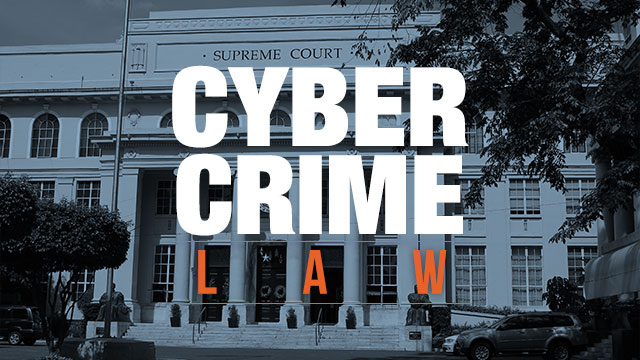SUMMARY
This is AI generated summarization, which may have errors. For context, always refer to the full article.

MANILA, Philippines – Youth groups want the Supreme Court (SC) to overturn its ruling declaring most provisions of the Cybercrime Prevention Act constitutional.
In an 11-page motion for reconsideration (MR) filed Tuesday, March 11, leftist youth leaders said the SC ruling “curtails freedom of expression and that of free speech.” (READ: SC rules online libel constitutional)
Specifically, petitioners cited provisions of the law on online libel, aiding and abetting cyber offenses, and the imposition of a penalty one degree higher for cybercrimes as “unconstitutional due to vagueness and overbreadth.” (READ: Making sense of online libel)
Section 5, the provision penalizing the aiding and abetting of cybercrimes, was declared unconstitutional in the following offenses: child pornography, unsolicited commercial communications (or spam), and online libel. It, however, applied to other cybercrimes outlined in the law. (READ: Cybersex, media, privacy and the cybercrime law)
Petitioners also said Section 6, which imposes a penalty one degree higher for offenses online,”effectively creates new crimes such as online rebellion.”
Rebellion or insurrection is a crime punished under the Revised Penal Code with reclusion temporal or temporary imprisonment. The petitioners said Section 6 can potentially penalize online rebellion, making the provision “absurd.”
“The people as a sovereign have all the right to rebel against unjust regimes, whichever form they wish to undertake, online or otherwise. Nonetheless, this argument is merely to raise the absurd logic of the higher liability provision of the cybercrime law. Certainly, it cannot be doubted that an actual rebellion is by far more serious a threat than a war waged by memes,” explained Kabataan Partylist Rep Terry Ridon.
Among the petitioners before the High Court are Alliance for Concerned Teachers Partylist Rep Antonio Tinio, UP College of Mass Communication Dean Roland Tolentino, former Kabataan Partylist Rep Mong Palatino, Anakbayan Chair Vencer Mari Crisostomo, blogger Katrina Stuart Santiago, Ma Katherine Elona of the Philippine Collegian, and Isabelle Therese Baguisi of the National Union of Students of the Philippines.
DOJ begins IRR consultations
The filing of the MR comes a day after the Department of Justice (DOJ) began its consultation on the implementing rules and regulations (IRR) of the Cybercrime law or Republic Act (RA) 10175.
RA 10175 will take effect only after the drafting and publication of the IRR.
Department of Justice (DOJ) Assistant Secretary Geronimo Sy, who heads the DOJ Office of Cybercrime, earlier said his office has completed the first draft of the IRR.
Its implementation, he said, will help in prosecuting cybercrimes already covered by other Philippine laws. These include cyberprostitution, a growing industry in the Philippines. (READ: NBI raids cybersex den in Navotas City)
On Monday, March 10, the DOJ convened its first working group tasked to formulate the IRR. The group includes the Information and Communications Technology Office of the Department of Science and Technology (ICTO-DOST) and the Department of the Interior and Local Government (DILG).
Justice Secretary Leila de Lima said the IRR is expected to be “straightforward and comprehensive.”
The laws that will be harmonized in the IRR include: RA 8484 or the Access Devices Regulation Act of 1998, RA 8792 or the E-Commerce Act of 2000, RA 9775 or the Anti-Child Pornography Act of 2009, and RA 9995 or the Anti-Photo and Voyeurism Act of 2009. – Rappler.com
Add a comment
How does this make you feel?
There are no comments yet. Add your comment to start the conversation.